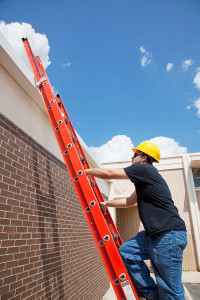What Does A Professional Roof Inspection Cover?

It doesn’t matter how strong or durable your roof is, you should still schedule a roof inspection at least twice a year. A roof inspection performed by a roofing contractor will ensure that your roof remains in good condition and can even help extend its life as a result.
Generally speaking, you should schedule a roof inspection in the fall to make sure it can withstand the harsh weather of winter and in the spring to make sure the previous winter season didn’t cause too much wear and tear.
The Typical Roof Inspection
The following are some of the typical things a professional roof inspector will look for and do when performing a roof inspection:
Ensure There’s Proper Ventilation
The inspector will check to make sure your attic is properly ventilated. If it’s not, it can lead to all kinds of problems that can affect your roof. For example, it can lead to ice damming in the winters, which can result in serious water damage.
Look for Mold and Moisture in the Attic
Besides looking at your ventilation, the inspector will also look for any signs of mold or excess moisture.
Check the Attic Insulation
To prevent excess moisture from forming, your attic needs to be properly insulated. This, in turn, will help prevent the heat your home produces from rising into your attic. The inspector will check the condition and effectiveness of your attic insulation.
Look for Potential Leaks
The inspector will look for any possible leaks or signs of leaks. They can do this by looking for water stains, light leaks and actual water leaks within your house and attic. They can also do a thorough evaluation of your roof from the exterior to identify any areas that might be vulnerable to potential leaks.
Replace Missing Shingles
Any missing shingles need to be replaced. Otherwise, the underlayment, as well as nearby shingles, will be more vulnerable to water and wind damage.
Check the Condition of the Shingles
In addition to replacing missing shingles, the inspector will do a careful inspection of the existing shingles. They will look for damage that necessitates individual shingle repair or replacement. They will also check the general condition of the shingles to determine if the entire roof needs replacement. This can be done by checking to see if the granules are still holding onto the shingles.
Inspect the Flashing
The flashing is vital to preventing leaks by the joints in the roof and wall construction. For example, flashing is typically installed around chimneys. If the flashing is damaged in any way, it could make the roof more vulnerable to potential leaks.
Evaluate the Structural Integrity of the Roof
Just because your roof doesn’t have major problems when it comes to the condition of your shingles or flashing doesn’t mean that your roof is structurally sound — especially if your roof is older than a couple of decades. The inspector will make sure that the underlayment is in good shape and that your roof doesn’t need replacement. One common sign that a roof is no longer structurally sound is if the roof has begun to sag.
Inspect the Condition of the Gutters
The purpose of your gutters is to prevent rainwater from leaking into your home and damaging your roof, walls or foundation. If they don’t work properly, it can result in costly damage. The inspector will check to make sure your gutters are properly attached, unclogged and in good condition.
These are the basics of a standard roof inspection. If you need roof repairs or replacement in Toledo, OH, be sure to contact us at All-Nu Construction today.

